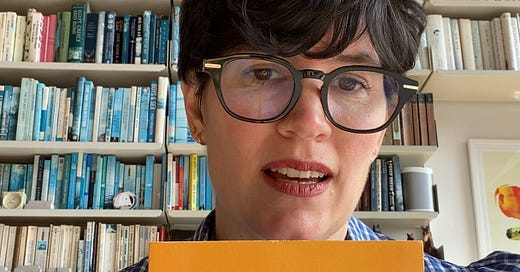TRANSCRIPT:
So there are many incredible books about systemic racism and culture, but this one is another essential addition, not only because it offers really new and interesting perspectives, but also because it gives a framework for how to have difficult conversations at a time when everyone is both angry, fearful, and scared of one of the worst designations that you can hear, which is that you are racist. So Celeste, who is a longtime radio journalist—APM, NPR—is masterful at conversation, and she has written this really insightful guide for leading us through really hard conversations that are essential. And one of the things she opens with is that one, we are all racist, everyone is full of implicit bias, whether we acknowledge it or not. And two, when we entire conversations wrong-spotting, which is an idea that it’s a debate and not a conversation, everyone loses.
CAPTION:
“A conversation, it should be noted, is not a debate. A debate will not change someone’s opinions, no matter how devastating your statistics or eye-opening your data. And yet we often enter exchanges about race armed with our anger and our facts. In doing so, we engage in a practice that the Harvard Negotiation Project, a division of the school founded in 1979 to address issues of conflict resolution, calls “wrong-spotting.” We already know how we feel about a person, we’re confident that we’re right, and we watch like a hawk for what they get wrong. When you are wrong-spotting, you will always feel vindicated because everyone makes mistakes or says things that seem wrong from your perspective.” This is from Celeste Headlee’s Speaking of Race, the guest on this week’s episode of Pulling the Thread. As a self-described “light-skinned Black Jew,” Celeste has spent most of her life thinking about race. And as a radio journalist (NPR, APM) she has also spent most of her life thinking about production conversation. There are a lot of formidable books about systemic racism, and Celeste’s is one of them: It’s unique in that it also provides widely applicable tools for all sorts of hard conversations, particularly those that revolve around some concept of moral identity. One of Celeste’s biggest revelations for me as a white person, is the research by Daniel Effron and his colleagues—along with another 2009 study from Stanford—that suggests that when white people like me give our vocal support for Obama, we actually behave in real life in ways that are more prejudiced. It’s like we grab the “I’m not racist” ring and use it as a shield for any future behavior that might be biased. I think about this daily. Another moment I loved, is a paragraph from the psychologist Carl Rogers that she cites, recommending that we all read it before entering into any tough discussion: “I’m interested in you as a person, and I think that what you feel is important. I respect your thoughts, and even if I don’t agree with them, I know that they are valid for you. I feel sure that you have a contribution to make. I’m not trying to change you or evaluate you. I just want to understand you. I think you’re worth listening to, and I want you to know that I’m the kind of a person you can talk to.”
6 KEY TEACHINGS:
1. We are all racist. Stop fighting it and start acknowledging it.
Here’s Headlee:
I will use this definition: a racist is someone who makes assumptions about another person (either positive or negative) because of their perceived race or ethnicity.
By that definition, we are all racist. Perhaps we don’t think horrible things about Muslims, but we might subconsciously assume all Mexicans are immigrants or all immigrants from India are hardworking. Maybe we think Koreans are good at video games or Native Americans are inherently and profoundly connected to the natural world. These are all racist assumptions.
2. Your political beliefs don’t matter: We all become entrenched regardless of how righteous (and right) we believe we are. Also, there’s evidence that smart people are more biased.
Watch with a 7-day free trial
Subscribe to Pulling the Thread with Elise Loehnen to watch this video and get 7 days of free access to the full post archives.





